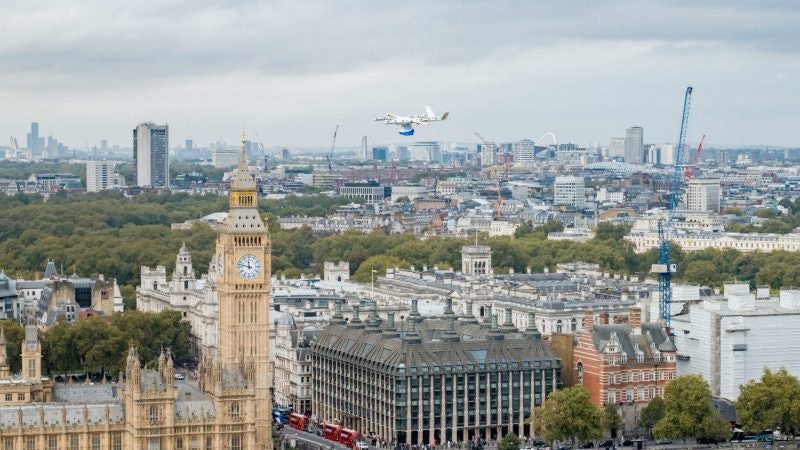An NHS pilot programme using drones to carry blood samples between two London-based hospitals kicked off on Monday, the first time aerial delivery has been trialled in the UK’s capital.
The pilot is a partnership between UK software startup Apian and US drone delivery startup Wing, a subsidiary of Alphabet and a graduate of its “moonshot factory”. Apian’s software — which connects the drones to healthcare providers and handles orders, scheduling and live-tracking — has already been used in other regions.
The drones will each be controlled by a single pilot, but in the future Apian hopes regulators will approve multi-drone piloting, where a single operator controls multiple aircraft with the help of autonomous technology.
The companies say drone delivery will reduce a journey which can take up to half an hour by road to just a couple of minutes, meaning quicker decisions can be made in determining whether patients are safe to undergo surgery.
The news comes following years of promising moves for drone startups in Europe — from delivering everyday items to developing defence tech applications — but few examples of chunky commercial deals to roll out the tech at scale.
“Drones have been overestimated in the short term, but underestimated in the long term,” says Alexander Trewby, CEO and cofounder of Apian — adding that infrastructure limitations in urban areas mean there’s big potential.
“Cities like London face a unique challenge: built vertically but relying on 2D roads, they’re choked by polluting congestion,” he tells Sifted. “Apian’s ambition is to create an autonomous delivery network operating at NHS scale, moving physical items as productively as the internet moves information.”
But these companies are still at the mercy of the regulators, who remain cagey about letting autonomous technology — which would allow startups to operate at scale — take to the skies.
Healthcare drone delivery
Blood samples are currently delivered by van or motorbike couriers — which can get held up in traffic on London’s congested streets. Apian’s new pilot will reduce a 3km journey by road to just 1km by air, shortening the time it takes to approve high-risk patients for surgery.

The trial “should speed up test results for some of our most vulnerable patients”, says Lawrence Tallon, Deputy Chief Executive of the Guy's and St Thomas' NHS Foundation Trust. The programme will run for six months ferrying up to 10 deliveries each carrying 20 samples a day between labs at Guy’s Hospital and St Thomas’ Hospital.
It promises greener deliveries, too. According to one report, lightweight commercial drones can reduce CO2 emissions by up to 99% compared to non-electric cars.
Apian’s trial is one of a growing list of real-life drone use cases around the globe, the vast majority of which are in delivery and defence applications. But, so far, there have been a limited number of commercial contracts at scale secured by startups.
Challenges commercialising
While Trewby points to partnerships between US supermarket giant Walmart and drone companies Wing and Zipline — a San Francisco-based startup that has raised $814m, according to Dealroom — as a sign of increasing commercial appetite, he adds that there have been no “significant” deals signed in Europe yet.
Founded in 2020, Apian has begun making revenue through projects smaller than this partnership with Guys and St Thomas’ hospitals (which the startup is funding itself), Trewby tells Sifted, although he won’t say how much.
The startup is running a medical delivery drone programme in Dublin too and has previously run one in the north of England. There have also been small scale medical delivery drone projects run by other operators in European countries such as Denmark and Norway.
But the regulatory environment poses a challenge for those trying to commercialise drone technology.
It took Apian two years to convince UK airspace regulator the Civil Aviation Authority (CAA) to let them run a pilot programme in London, says Trewby. The “complex” airspace over an urban area as sprawling as London — which has at least five major airports — means there’s a myriad of hoops a drone startup needs to jump through to fly.
Regulatory bodies are one of several obstacles that remain in the way of large-scale deployment of drone tech, says Seb Hunte, investment manager at AlbionVC — which has backed UK-based StanhopeAI, a startup building autonomous drone systems.
“The complex, often fragmented regulatory environment continues to inhibit drone deployment across various sectors, applications and geographies,” he says. “Technical issues, particularly around battery life can also limit flight duration, payload capacity and speed of recharge.”

While Bobby Healy, founder of Irish drone startup Manna — which has raised $30m, according to Dealroom — estimates that it will take five to 10 years for its drones to take over a significant market share from road-based delivery, Trewby thinks Apian can become EBITDA positive in two years.
But, to get there, he says the startup will need to convince the regulator to allow a single pilot to fly multiple drones at once using autonomous technology: “The economics of drone delivery come into play at scale.”
While the CAA doesn’t yet permit this, similar tech already exists — and is being used in parts of Australia and the US.
Can drones hit the skies en masse?
There are signs that investors are warming to drone tech. In April, UK-based Skyports raised $110m for its network of “veritports” — infrastructure that enables electric vertical takeoff and landing aircraft (eVTOL), including drones, to land and take off. Bulgaria-UK drone delivery startup Dronamics also raised $10.9m in March.
There’s also been several raises for startups using drones for defence applications. Last month, Germany’s Stark raised €14m and, in September, compatriot Quantum Systems, which is building dual use drone tech, raised €100m.
Apian says its software can work with any healthcare provider or drone operator and could in the future be used to deliver samples between labs to increase diagnostics turnaround time, medical supplies for pharmacies and medical devices from hospitals to the home.
To get there, it will need to raise more VC funding but Trewby is tight-lipped about the size of the cheque it's after. Apian previously picked up a £5m seed round led by Localglobe, with participation from NHS-backed VC KHP Ventures, and Trewby says the startup will go back out to the fundraising market in the first half of 2025.
But while the next round will be a step in the right direction towards the company’s goal of building a drone logistics network at scale, it'll then have the hefty task of persuading regulators to relax regulation.



